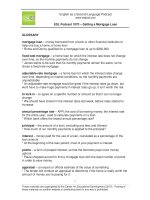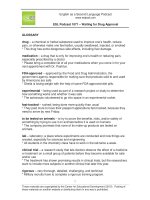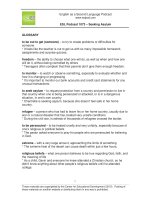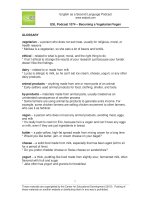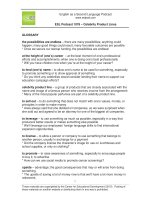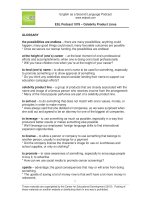ESL podcast 1075 – defying orders
Bạn đang xem bản rút gọn của tài liệu. Xem và tải ngay bản đầy đủ của tài liệu tại đây (94.38 KB, 10 trang )
English as a Second Language Podcast
www.eslpod.com
ESL Podcast 1075 – Defying Orders
GLOSSARY
order – a command; instruction about what one must do
* The military leaders gave orders to the soldiers to march up the enemy’s hill.
to keep watch – to monitor and observe something, but without getting involved
* We asked our neighbor to keep watch on our house while we’re on vacation.
consequence – a result or outcome of something; something that happens as a
result of something else
* Many believe that when parents don’t establish clear consequences for bad
behavior, their children will continue to misbehave.
to defy – to refuse to follow orders; to refuse to recognize and submit to
someone’s authority; to refuse to do what one has been told
* Teenagers sometimes think they need to defy their parents in order to prove
that they are becoming adults.
punishment – penalty; a negative consequence of one’s actions or words,
intended to make the person feel bad about his or her behavior and prevent it
from happening again
* In our house, the punishment for hitting my brother was being made to wash
the dishes all by myself.
to sit still – to not move
* How in the world are we supposed to get 10 preschoolers to sit still for five
minutes?
intervention – the act of becoming involved in something, especially to change
the process or outcome
* We thought the intervention would help, but it just made things worse.
to enter the fray – to become involved in a fight, argument, or dispute; to join a
situation that is hostile or very competitive
* As demand for oil increases, more drilling companies are entering the fray.
whatever means necessary – using whatever tools or strategies may be
available, without restricting oneself to using only certain ones
* Parents will make sure their children have enough to eat using whatever means
necessary
1
These materials are copyrighted by the Center for Educational Development (2015). Posting of
these materials on another website or distributing them in any way is prohibited.
English as a Second Language Podcast
www.eslpod.com
ESL Podcast 1075 – Defying Orders
to think (something) through – to carefully think about something before
making a decision; to carefully consider all the possible consequences of what
one is planning to do
* The company needs to think through all the possibilities before deciding where
it will open the next office.
to get the lay of the land – to understand the layout, organization, arrangement,
or structure of something, especially only through observation
* Working as a taxi driver really helped Khalil get the lay of the land. He knows
where everything is in this city.
to formulate – to create something, especially to develop an idea or plan
* The consultants are going to formulate a new marketing strategy for our
menswear division.
to work out – to be okay; to be successful or satisfactory, especially in an
uncertain environment
* Do you think these plans will work out even without the needed resources?
to stick (one’s) neck out – to take a risk; to do something that puts one at risk
or in danger of harm or punishment
* Why should I stick my neck out and try to help Harvey when I know he would
never do the same for me?
to twist (one’s) arm – to persuade someone to do something that he or she
would prefer not to do
* Basil twisted my arm, so I agreed to be the treasurer of the parent-teacher
association.
to squeal on (someone) – to tattle; to report someone else’s bad behavior,
especially to the authorities
* Shane squealed on his friend, telling the principal that she had put a frog in the
teacher’s desk.
sense of honor – feelings of wanting to do what is noble, right, and ethical
* His sense of honor compelled him to tell the truth, even when he knew it would
get him in trouble.
against (one’s) better judgment – not in agreement or alignment with what one
thinks is probably right or correct; despite what one believes is correct or true
* Against my better judgment, I told Medina my secret, even though she has
never been able to keep a secret in the past.
2
These materials are copyrighted by the Center for Educational Development (2015). Posting of
these materials on another website or distributing them in any way is prohibited.
English as a Second Language Podcast
www.eslpod.com
ESL Podcast 1075 – Defying Orders
COMPREHENSION QUESTIONS
1.
a)
b)
c)
According to Carol, what are they supposed to do?
Keep track of what time it is.
Call in the orders to the restaurant.
Observe to see what happens.
2.
a)
b)
c)
What does Miguel mean when he says, “I’m not twisting your arm”?
He isn’t trying to hurt Carol.
He isn’t forcing Carol to do anything.
He isn’t giving Carol advice.
______________
WHAT ELSE DOES IT MEAN?
order
The word “order,” in this podcast, means a command or instruction about what
one must do: “The police officers issued an order for everyone to stay inside the
building until the criminal could be found.” The word “order” can also refer to the
arrangement or layout of something: “Please file these papers in alphabetical
order.” Or, “The important dates are listed in chronological order.” An “order” is a
request for the items one wants to buy: “Where’s the order for Table 7? They’re
still waiting for those pancakes.” Or, “We just received a purchase order for five
new trucks.” Finally, the exclamation “Order!” is used to get people’s attention
and get them to stop talking so that a meeting can begin or continue: “Order! The
judge is ready to make her announcement.”
to squeal on (someone)
In this podcast, the phrase “to squeal on (someone)” means to tattle or to report
someone else’s bad behavior, especially to the authorities: “Yes, I stole the
books. But you have to tell me who squealed on me!” Or, “If you squeal on me,
I’ll never forgive you.” In other contexts, the verb “to squeal” means to make a
loud, high-pitched noise: “The young girls squealed with excitement when they
saw their favorite singer at a local restaurant.” Or, “’Stop doing that,’ she
squealed.” Or, “Those teenagers are doing it again, accelerating quickly so that
their tires squeal on the pavement.” A “squeal” is also the sound that a pig
makes: “Why are the pigs squealing so much? Did one of the dogs get in their
pen again?”
3
These materials are copyrighted by the Center for Educational Development (2015). Posting of
these materials on another website or distributing them in any way is prohibited.
English as a Second Language Podcast
www.eslpod.com
ESL Podcast 1075 – Defying Orders
CULTURE NOTE
Types of Military Court-Martial
A “court-martial” is a military court that is used for lawsuits against “members of
the armed services” (people who are serving in the army, navy, marines, air
force, or coast guard) who are “accused” (said to have done something bad) of
breaking a military law. In the United States, there are three types of courtsmartial: “summary,” “special,” and “general.”
A “summary court-martial” is the simplest and lowest court level. It is used for
“minor” (not very important or serious) “incidents” (negative episodes or
instances of behavior). There is only one “officer” (a person who fills a particular
role) and punishments are limited.
The next court level is the “special court-martial,” which is used for “trials”
(lawsuits) involving more serious “offenses” (crimes; instances of breaking a law).
The special court-martial has a “judge” (the person who controls the court
sessions and determines the appropriate punishment), a lawyer for each side of
the case, and at least three officers who “comprise” (make up) the “jury,” or the
group of people who listen to a trial and decide whether the “defendant” (the
person accused of committing a crime) is “guilty” (has broken the law) or
“innocent” (has not broken the law). Punishments can include “short-term”
(temporary; lasting only a little while) “confinement” (being held in prison) of “up
to” (no more than) one year or “pay cuts” (reductions in the amount of money one
receives for one’s work).
A “general court-martial” is the highest court level and is used only for the most
serious offenses. At least five officers are on the jury. Punishments can include a
longer confinement, “discharge” (being forced to leave the armed services), and
even death, depending on the offense.
______________
Comprehension Questions Correct Answers: 1 – c; 2 – b
4
These materials are copyrighted by the Center for Educational Development (2015). Posting of
these materials on another website or distributing them in any way is prohibited.
English as a Second Language Podcast
www.eslpod.com
ESL Podcast 1075 – Defying Orders
COMPLETE TRANSCRIPT
Welcome to English as a Second Language Podcast number 1,075 – Defying
Orders.
This is English as a Second Language Podcast episode 1,075. I’m your host, Dr.
Jeff McQuillan, coming to you from the Center for Educational Development in
beautiful Los Angeles, California. I know, it’s a little crazy.
Our website is ESLPod.com. There’s nothing crazy about that. If you go there,
you can become a member of ESL Podcast. How cool is that?
On this episode, we’re going to have a dialogue between Carol and Miguel about
someone who doesn’t do what he is told to do – someone who defies orders.
Let’s get started.
[start of dialogue]
Carol: Hey, where are you going?
Miguel: We can’t sit here doing nothing.
Carol: We have orders to stay here and to keep watch. You know as well as I do
what the consequences are of defying orders.
Miguel: I don’t care what kind of punishment I get. I can’t sit still and let things
happen without an attempt at intervention.
Carol: What are you going to do, enter the fray without a plan?
Miguel: I have a plan. I’m going to stop what’s going on using whatever means
necessary.
Carol: By doing what? Have you thought this through?
Miguel: I’ll get the lay of the land and then formulate some options. Everything
will work out.
Carol: And I suppose you expect me to go with you, to stick my neck out, too?
Miguel: That’s up to you. I’m not twisting your arm.
5
These materials are copyrighted by the Center for Educational Development (2015). Posting of
these materials on another website or distributing them in any way is prohibited.
English as a Second Language Podcast
www.eslpod.com
ESL Podcast 1075 – Defying Orders
Carol: How do you know that if I stay here, I won’t squeal on you?
Miguel: I don’t. I guess I just have to rely on your sense of honor.
Carol: Oh, come on, let’s go.
Miguel: You’re coming with me?
Carol: Against my better judgment!
[end of dialogue]
Carol begins our dialogue by saying, “Hey, where are you going?” Miguel says,
“We can’t sit here doing nothing.” Carol says, “We have orders to stay here and
keep watch.” So, Carol is asking Miguel where he is going, and Miguel says that
he doesn’t want to just sit there and do nothing, but Carol says that the two of
them “have orders.” If you say you “have orders,” you mean that someone has
given you instructions – someone has told you what you are supposed to do,
usually someone in authority.
You can think about the military – for example, the army or the navy – where one
of the leaders will give orders to the other members of the military, telling them
what to do. Miguel and Carol’s orders are to keep watch. The phrasal verb “to
keep watch” (watch) means to monitor something – to observe something, but
not to do anything or get involved with that thing.
So, if you are keeping watch, for example, in front of a building, you are watching
to see what is going on, usually because you’re looking for a problem. If there is
a problem, then you’re supposed to call someone else and that other person will
deal with or take care of the problem. Or you might be keeping watch because
you are expecting someone to arrive, and the person who gave you the orders to
keep watch wants you to tell him or her when the arrival takes place.
Carol says, “You know as well as I do what the consequences are of defying
orders.” A “consequence” is a result of something, something that happens as a
result of something else. There’s an old expression, “Ideas have consequences,”
that means that when you have certain moral, religious, political, or ethical
opinions about things, ideas about things, those ideas often have practical results
in the real world. They actually will influence the way people behave, the way
people act.
6
These materials are copyrighted by the Center for Educational Development (2015). Posting of
these materials on another website or distributing them in any way is prohibited.
English as a Second Language Podcast
www.eslpod.com
ESL Podcast 1075 – Defying Orders
Here, Carol is talking about the consequences “of defying orders.” “To defy”
(defy) means to refuse to do something, to say no to someone who has authority
over you. Carol reminds Miguel that there are consequences for defying orders.
Miguel says, “I don’t care what kind of punishment I get.” A “punishment” is a
negative consequence or a negative result, usually something that you get
because you did something wrong.
Miguel says, “I can’t sit still and let things happen without an intervention.” “To sit
still” means to not move, to remain in one place. If you are keeping watch, you
may also be sitting still – that is, you’re not moving around, you’re just staying
where you are. But Miguel says he cannot “sit still and let things happen without
an intervention.”
An “intervention” (intervention) is the act of becoming involved in something,
especially to change the process or the result of some action. We could speak of
a “military intervention,” where one country sends its army or its military into
another country in order to prevent something bad from happening in the other
country – or at least, that’s what the normal excuse is for military interventions.
We also use the term “intervention” nowadays perhaps more commonly to refer
to a situation where a person has a problem with drugs or alcohol. The person’s
friends and family want to tell this person to stop, to get help, and so they may
put this person in a room and all of them together will talk to the person and try to
convince the person to get help with his or her drug or alcohol problem. That’s an
“intervention.”
Carol says, “What are you going to do? Enter the fray without a plan?” “To enter
the fray” (fray) means to become involved in a fight, argument, or disagreement –
to join into a situation that is hostile, or perhaps people are yelling at each other
or even fighting physically with each other. Miguel says, “I have a plan” – I have
an idea about what I’m going to do – “I’m going to stop what’s going on using
whatever means necessary.”
The word “means” (means) here refers to the method, the manner, or the
approach that you use in order to get something done. “Whatever means
necessary” is used in a situation where you will do anything. You will do whatever
it takes in order to get the result you want to get. Carol is still confused about
what Miguel plans to do. She asks, “By doing what?” – “What exactly are you
going to do, Miguel?” she’s asking.
She asks, “Have you thought this through?” “To think something through” is to
think carefully about something – to think of all the possible consequences of
7
These materials are copyrighted by the Center for Educational Development (2015). Posting of
these materials on another website or distributing them in any way is prohibited.
English as a Second Language Podcast
www.eslpod.com
ESL Podcast 1075 – Defying Orders
your actions, to really understand what you are doing, including what might go
wrong or what problems you might face as you do this action. Miguel then gives
us a little bit of his plan. He says, “I’ll get the lay of the land and then formulate
some options. Everything will work out.”
“To get the lay (lay) of the land” means to understand the way things are
organized by looking at the situation or by looking at a particular place.
Physically, “to get the lay of the land” would be to understand where everything is
– where the roads are, where the streets are, where the houses are – in a given
area. It can be used more generally to mean to understand the way things are
organized, the way an organization or business is organized, for example.
Miguel says that he will “formulate some options.” The verb “to formulate”
(formulate) means to come up with or develop something, to think of something.
Miguel says, “Everything will work out.” If someone says, “It’s going to work out,”
he means that it’s going to be okay. It’s going to be successful. There aren’t
going to be any problems.
Carol says, “And I suppose you expect me to go with you, to stick my neck out,
too?” “To stick your neck out” is an expression meaning to take a risk, to do
something that might cause you harm or injury or put you in danger. Miguel says,
“That’s up to you,” meaning that’s your decision; I’m not going to force you. In
fact, the next sentence is “I’m not twisting your arm.”
“To twist (twist) someone’s arm” is to persuade someone to do something that
the person doesn’t really want to do – to force the person to do something. If you
can think of your arm and someone putting your arm behind your back in a
painful way, then you understand where this expression comes from. “To twist
someone’s arm” – to make them do something because you are pressuring
them.
Carol says, “How do you know that if I stay here” – if I don’t go with you – “I won’t
squeal on you?” “To squeal (squeal) on” someone means to report someone’s
bad behavior to someone else – to tell someone else, usually someone in
authority, about bad things that someone else has done.
Miguel says, “I don’t,” meaning I don’t know if you will squeal on me or not. “I
guess I just have to rely” (or depend) “on your sense of honor.” A “sense of
honor” (honor) is wanting to do the right thing, the ethical thing, the moral thing.
Carol says, “Oh, come on, let’s go.” Miguel asks, “You’re coming with me?” He’s
surprised that Carol is going to go with him.
8
These materials are copyrighted by the Center for Educational Development (2015). Posting of
these materials on another website or distributing them in any way is prohibited.
English as a Second Language Podcast
www.eslpod.com
ESL Podcast 1075 – Defying Orders
Carol says, “Against my better judgment!” The expression “against one’s better
judgment” means that you don’t agree with what this person is saying or what
this person wants to do, but you’re going to do it anyway. You’re going to go
“against your better judgment” – against your own reason, against the logic in
your own mind, and instead, you’re going to do what this person wants you to do.
Now let’s listen to the dialogue, this time at a normal speed.
[start of dialogue]
Carol: Hey, where are you going?
Miguel: We can’t sit here doing nothing.
Carol: We have orders to stay here and to keep watch. You know as well as I do
what the consequences are of defying orders.
Miguel: I don’t care what kind of punishment I get. I can’t sit still and let things
happen without an attempt at intervention.
Carol: What are you going to do, enter the fray without a plan?
Miguel: I have a plan. I’m going to stop what’s going on using whatever means
necessary.
Carol: By doing what? Have you thought this through?
Miguel: I’ll get the lay of the land and then formulate some options. Everything
will work out.
Carol: And I suppose you expect me to go with you, to stick my neck out, too?
Miguel: That’s up to you. I’m not twisting your arm.
Carol: How do you know that if I stay here, I won’t squeal on you?
Miguel: I don’t. I guess I just have to rely on your sense of honor.
Carol: Oh, come on, let’s go.
Miguel: You’re coming with me?
9
These materials are copyrighted by the Center for Educational Development (2015). Posting of
these materials on another website or distributing them in any way is prohibited.
English as a Second Language Podcast
www.eslpod.com
ESL Podcast 1075 – Defying Orders
Carol: Against my better judgment!
[end of dialogue]
Our scriptwriter helps you learn English by whatever means necessary –
especially by writing good scripts. Thank you, Dr. Lucy Tse.
From Los Angeles, California, I’m Jeff McQuillan. Thank you for listening. Come
back and listen to us again right here on ESL Podcast.
English as a Second Language Podcast was written and produced by Dr. Lucy
Tse, hosted by Dr. Jeff McQuillan. Copyright 2015 by the Center for Educational
Development.
10
These materials are copyrighted by the Center for Educational Development (2015). Posting of
these materials on another website or distributing them in any way is prohibited.
